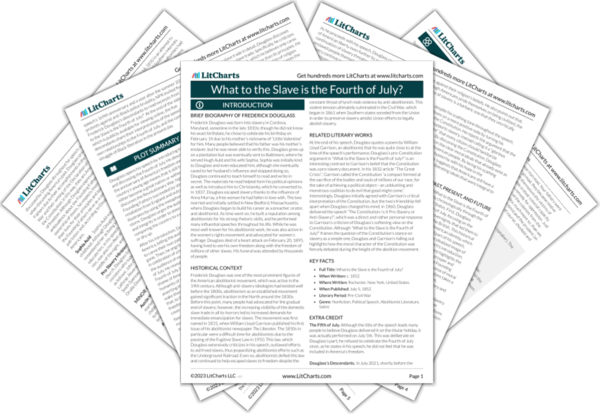The structure of “What to the Slave is the Fourth of July?” moves roughly chronologically through the history of the United States. First, Douglass discusses the history of the Fourth of July, focusing on the Founding Fathers’ strong belief in sovereignty that led them to fight back against the oppression of the British. This historical background forms an integral part of American identity, which Douglass heavily criticizes in the second part of his speech, focusing on the present. In contrast to the idealized image of America’s past that he presents in the speech’s introduction, Douglass’s discussion of the American present highlights the country’s moral failings in allowing slavery to prosper and accuses present-day Americans of riding on the Founding Fathers’ coattails in order to give themselves a sense of moral legitimacy. To conclude his speech, however, Douglass takes a more positive tone as he looks forward to the future, expressing his hope that America can overcome slavery and grow into a more just and prosperous nation.
Douglass’s historical contextualization of America and slavery is an important rhetorical technique for the speech. Rather than discussing the atrocity of slavery in a vacuum, he positions it within the broader picture of America. He makes this decision not to teach the audience about the origins of slavery—given that it is still an active industry, he can safely assume most people are familiar with this—but to make them uncomfortable by highlighting how far America has strayed from the ideals that the Founding Fathers have laid out. However, focusing on America’s history also allows Douglass to emphasize just how young the nation really is, a fact that makes him hopeful for the country’s redemption—there is still time for America to embrace and live out its ideals more fully.
America’s Past, Present, and Future ThemeTracker

America’s Past, Present, and Future Quotes in What to the Slave is the Fourth of July?
Oppression makes a wise man mad. Your fathers were wise men, and if they did not go mad, they became restive under this treatment. They felt themselves the victims of grievous wrongs, wholly incurable in their colonial capacity. With brave men there is always a remedy for oppression. Just here, the idea of a total separation of the colonies from the crown was born! It was a startling idea, much more so, than we, at this distance of time, regard it. The timid and the prudent (as has been intimated) of that day, were, of course, shocked and alarmed by it.
There is consolation in the thought that America is young. Great streams are not easily turned from channels, worn deep in the course of ages. They may sometimes rise in quiet and stately majesty, and inundate the land, refreshing and fertilizing the earth with their mysterious properties. They may also rise in wrath and fury, and bear away, on their angry waves, the accumulated wealth of years of toil and hardship. They, however, gradually flow back to the same old channel, and flow on as serenely as ever. But, while the river may not be turned aside, it may dry up, and leave nothing behind the withered branch, and the unsightly rock, to howl in the abyss-sweeping wind, the sad tale of departed glory. As with rivers so with nations.
For my part, I would say, welcome infidelity! welcome atheism! welcome anything! in preference to the gospel, as preached by those Divines! They convert the very name of religion into an engine of tyranny, and barbarous cruelty, and serve to confirm more infidels, in this age, than all the infidel writings of Thomas Paine, Voltaire, and Bolingbroke, put together, have done!
[In England], the church, true to its mission of ameliorating, elevating, and improving the condition of mankind, came forward promptly, bound up the wounds of the West Indian slave, and restored him to his liberty. There, the question of emancipation was a high[ly] religious question. … The anti-slavery movement there was not an anti-church movement, for the reason that the church took its full share in prosecuting the movement: and the anti-slavery movement in this country will cease to be an anti-church movement, when the church of this country shall assume a favorable, instead of a hostile position towards that movement.
I scout the idea that the question of the constitutionality or unconstitutionality of slavery is not a question for the people. I hold that every American citizen has a right to form an opinion of the constitution, and the propagate that opinion, and to use all honorable means to make his opinion the prevailing one. Without this right, the liberty of an American citizen would be as insecure as that of a Frenchman.











